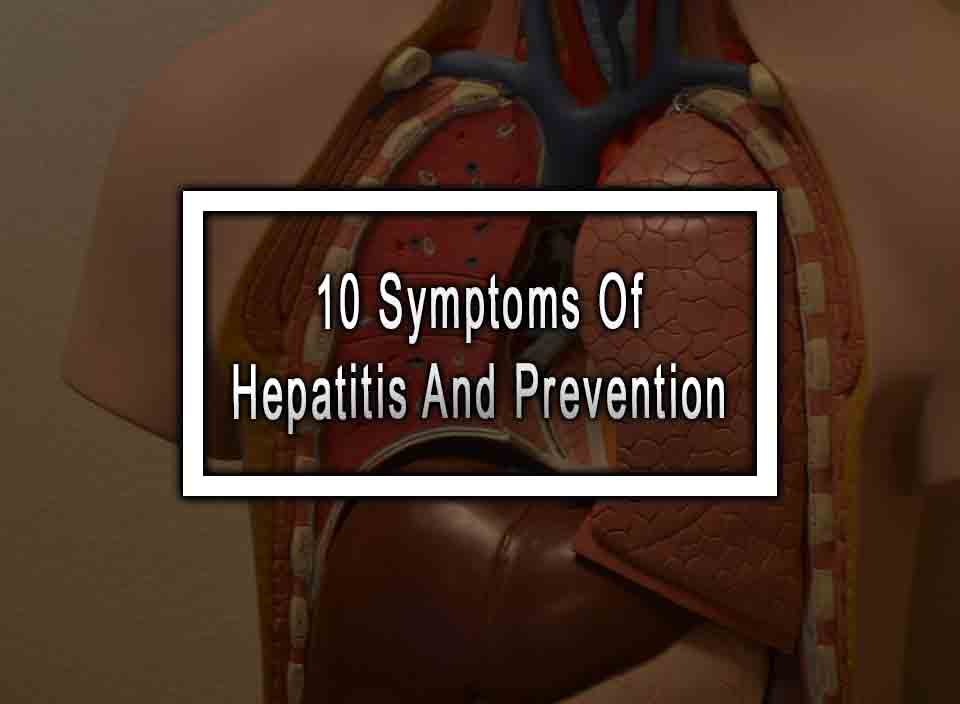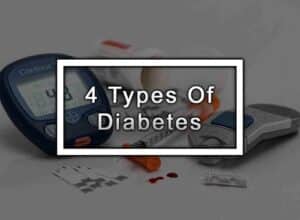Here Are The Symptoms Of Hepatitis And Prevention
Hepatitis is a medical condition that refers to inflammation in the liver caused by a virus, alcohol, or other toxic substances. The liver plays a crucial role in our body as it filters out toxins, helps in the digestion of food, and stores energy. When the liver becomes inflamed, its functions are affected, and it can lead to serious health complications. Hepatitis can be acute or chronic, and its symptoms can vary depending on the type of virus. In this article, we will discuss the symptoms of hepatitis and how to manage the condition.
Symptoms of Hepatitis

The symptoms of hepatitis can be subtle or severe and can vary depending on the type of virus. Some of the common symptoms of hepatitis include:
1. Fatigue
Fatigue is a common symptom of hepatitis that can significantly impact daily activities. This profound tiredness can be persistent and debilitating, differing from general sleepiness. To combat the fatigue associated with hepatitis, maintaining a healthy lifestyle that includes adequate rest, a balanced diet, and regular physical activity is crucial. As a preventive measure, vaccination, avoiding risky behaviors like sharing needles, and practicing good hygiene can significantly reduce the chances of contracting hepatitis, thereby preventing symptoms like fatigue.
2. Nausea and vomiting
Nausea and vomiting are often early symptoms of hepatitis, which can lead to dehydration and an imbalance of electrolytes if not managed adequately. Frequent handwashing, consuming well-cooked foods, and drinking clean water are integral parts of hepatitis prevention. By avoiding the consumption of potentially contaminated foods or water, one can prevent these distressing symptoms and protect the liver from further damage.
3. Loss of appetite
Loss of appetite is a troublesome symptom of hepatitis, which can affect nutritional intake and overall health. Those experiencing a decrease in appetite should focus on small, nutrient-dense meals and consult healthcare professionals for dietary management. Preventing hepatitis transmission through vaccination, safe sexual practices, and mindfulness regarding bodily exposures can avert the onset of appetite-reducing symptoms and support liver health.
4. Abdominal pain
Abdominal pain, specifically in the upper right quadrant of the abdomen, where the liver is located, is a notable symptom of hepatitis. Individuals are advised to avoid consuming alcohol and to monitor their medication intake, as these may exacerbate liver inflammation. Symptoms of hepatitis and prevention measures, such as getting vaccinated and avoiding exposure to the virus, can reduce the risk of abdominal pain and promote liver health.
5. Jaundice
Jaundice, the yellowing of the skin and the whites of the eyes, signals liver dysfunction typically associated with hepatitis. Regular monitoring of one’s health and seeking immediate medical care when symptoms such as jaundice appear are crucial. Hepatitis prevention strategies, including vaccination and maintaining clean and sanitary environments, are effective measures for curbing the spread of the virus and preventing the onset of jaundice.
6. Dark urine
Dark urine, often described as tea-colored, is among the symptoms of hepatitis, indicating the presence of bilirubin in the urine due to liver inflammation or damage. Drinking plenty of fluids and avoiding hepatotoxic substances can help manage this symptom. Prevention strategies, especially in regions with high hepatitis prevalence, include ensuring safe blood transfusions and abiding by health regulations to curb the epidemic.
7. Pale stool
Pale stool may be observed in hepatitis patients as a result of impaired bile secretion. This altered bowel movement characteristically lacks the normal brown color. To prevent the illnesses that can lead to symptoms such as pale stool, one should be vigilant with personal hygiene, avoid sharing personal items like razors, and engage in protected sexual practices to minimize the risk of viral transmission.
8. Joint pain
Joint pain, experienced in conjunction with other symptoms, can signify a systemic inflammatory response, as seen in hepatitis. Employing preventive tactics such as receiving appropriate immunizations, particularly in endemic areas, can help deter the spread of hepatitis, thereby reducing the incidence of associated joint pain and other symptoms. It becomes imperative for individuals to be proactive in their healthcare and remain aware of any unusual body pains that could correlate with liver issues.
9. Itchy skin
Itchy skin, or pruritus, is a less commonly recognized symptom of hepatitis but can be quite bothersome to those affected. Symptom management may involve using soothing lotions and avoiding irritants, while key prevention techniques include sterilization of medical equipment and thorough screening of blood donations to prevent transmission of the disease, mitigating the risk of itchy skin and other hepatitis symptoms.
10. Fever
Fever is a symptom that may manifest due to the body’s immune response to hepatitis. It serves as an indication that something is amiss, prompting a medical evaluation. Maintaining strict standards for injectable drugs, ensuring sanitary tattoo and piercing services, and promoting universal vaccination can reduce infection rates, averting symptoms like fever and further health ramifications associated with hepatitis.
Diagnosis and Treatment

If you experience any of the above symptoms, it is important to see a doctor. The doctor will perform a physical exam and order blood tests to check for signs of inflammation in the liver. If the blood tests show signs of hepatitis, the doctor may order additional tests, such as a liver biopsy or imaging tests, to determine the extent of the damage to the liver.
The treatment for hepatitis depends on the type of virus and the severity of the condition. If the hepatitis is caused by a virus, the doctor may prescribe antiviral medications to help fight the virus. If the hepatitis is caused by alcohol or other toxic substances, the doctor may recommend lifestyle changes, such as avoiding alcohol and improving your diet. In some cases, a liver transplant may be necessary.
Prevention

Preventing hepatitis is key to avoiding the symptoms and complications of the condition. Here are some ways to prevent hepatitis:
- Vaccination: Vaccination is the best way to prevent hepatitis. There are vaccines available for hepatitis A and B.
- Practice good hygiene: Wash your hands regularly with soap and water to prevent the spread of hepatitis.
- Avoid sharing personal items: Avoid sharing personal items, such as razors and toothbrushes, to prevent the spread of hepatitis.
- Practice safe sex: Use condoms during sex to prevent the spread of hepatitis.
- Avoid alcohol and drugs: Avoid alcohol and drugs, as they can damage the liver and increase the risk of hepatitis.
Conclusion
Hepatitis is a serious medical condition that can cause inflammation in the liver and lead to serious health complications. The symptoms of hepatitis can vary depending on the type of virus, but common symptoms include fatigue, nausea, vomiting, loss of appetite, abdominal pain, jaundice, dark urine, pale stool, joint pain, itchy skin, and fever. If you experience any of these symptoms, it is important to see a doctor. The treatment for hepatitis depends on the type of virus and the severity of the condition. Preventing hepatitis is key to avoiding the symptoms and complications of the condition, and this can be achieved through vaccination, good hygiene practices, avoiding sharing personal items, practicing safe sex, and avoiding alcohol and drugs.
Symptoms Of Hepatitis FAQ
Here are the most common questions about the symptoms of hepatitis.
1. How do I know if I have hepatitis?
If you are experiencing any symptoms of hepatitis, it is important to see a doctor for an evaluation. Your doctor may order blood tests to check for hepatitis viruses in your blood.
2. Can hepatitis be asymptomatic?
Yes, some people with hepatitis may not experience any symptoms. This is particularly true of hepatitis B and C, which can cause chronic infections that may not present symptoms until liver damage has occurred.
3. How long does it take for symptoms of hepatitis to appear?
The incubation period for hepatitis viruses can vary, but symptoms usually appear within 2 to 6 weeks after exposure to the virus.
4. Can hepatitis cause other health problems?
Yes, hepatitis can cause liver damage, liver failure, and liver cancer if left untreated for a long time. It can also increase the risk of other health problems, such as kidney disease, diabetes, and cardiovascular disease.
5. How is hepatitis treated?
Treatment for hepatitis depends on the type of virus that causes it and the severity of the infection. Some people may not require treatment and can recover on their own, while others may need antiviral medications or other treatments to manage their symptoms and prevent liver damage. In some cases, a liver transplant may be necessary.
More like this: 3 Ways To Remove Warts












